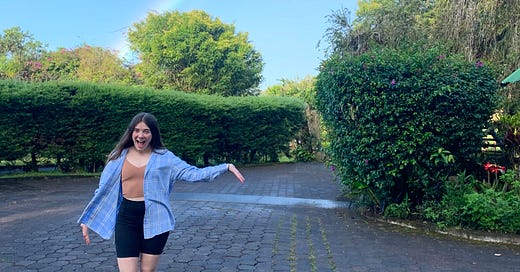Recognizing the "Englishization" of the World 🌎
The privilege of speaking English as your first language...
About a year and a half ago, I went on a transformative mission trip to San José, Costa Rica. Before my group left for the trip, I was informed that the Costa Rican poverty level, religious climate, and cultural norms would be different from those in the U.S.A., but I was still unprepared for what I discovered about language around the world.
My group spent our week in Costa Rica teaching English at a technical high school. This was a special school that aimed to help high-achieving Costa Rican students prepare for higher education.
I’d been out of the country on mission trips before, but my trip to Costa Rica was different because I was actually working in a school with teenagers who were dedicated to learning English. Everything about this school was in sharp contrast to my own education. First off, the students attended school for nearly 9 hours per day. That’s 2 hours longer than my high school days in the U.S. had been (and as a student, I thought those 7-hour days were way too long!). Second, the Costa Rican students spent approximately 2-3 hours of those 9 hours studying English.
After adding in the students’ lunch and between-class breaks, that means these teenagers were spending about a third of their educational time learning to read, write, and speak a language that was not their native language.
In case you’re unaware, Spanish is the official language of Costa Rica, and was the language which all of the students that I worked with spoke as their first language. Spanish is a major language: it is the second most popular native language in the world, with over 500 million native speakers. This is important because it shows that these students weren’t spending a third of their time learning a new language because theirs was a minor language which might be difficult to employ in connecting with the rest of the world (not that these languages are any less important or valid). These students were spending a third of their time learning the most popular native language, because theirs, the second most popular, still wouldn’t provide them with the same opportunities as English.
For a week, I watched these high school kids struggle to learn English. I watched these teenagers try really hard, and I mean really hard, to learn my language. Many of them knew their only ticket to well-rated higher education, international job opportunities/internships, or life in another country was to learn English.
Look, I know the world’s unfair. But that’s an incredibly heavy burden for teenagers to bear. Especially when I consider that many of the students I learned Spanish alongside in my U.S. public high school (for only 50 minutes a day, I might add) complained incessantly about how “stupid” it was that we had to take a foreign language to graduate.
How inconsiderate, how privileged, how unloving of us, in a place where we’ve grown up with the “universal language,” to give no attention to the language, culture, and beauty of others.
I’m not at all saying you need to be bilingual to be a good person. What I am saying is we have to realize how much of an advantage we have as native English speakers, and we have to respect foreign language study in our schools. American kids should understand another language and respect another culture, even if the level to which they’re able to study it is only basic.
Note that, in this article, I’m not even discussing the many economic or political reasons why it’s beneficial for U.S. students to learn and speak more than just English. I am simply discussing the moral value of understanding multiple languages.
I remember the look of shock on those kids’ faces when I, a young woman with no Hispanic/Latin American ancestry, addressed them in their own language. When I taught these students English, they were way more excited to listen to me when they realized that I was struggling to learn Spanish at the same time! When they saw that I cared about them and their world, they were way more interested in learning about me and my world. I was asked by multiple students where I had learned Spanish; the students typically assumed my mother or father was a Spanish speaker. They simply couldn’t believe that I took the time to learn their language even though there is not a single Spanish speaker in my close or extended family.
This is not to toot my own horn, I promise. I am not a fluent Spanish speaker, even after extensive study. I am not perfectly culturally sensitive; how could I be? But I will always try to understand, listen, learn, and respect the beauty of other languages.
If a 14-year-old Costa Rican kid has to spend 3 hours a day learning my native language, it’s the least I can do.
Thanks for reading today’s post! I’d love to hear what you thought and how you feel about language learning.






Do you know how long it took me to get Word to default to UK dictionary?
I took 3 years of Spanish in High School, enough to be conversational. Just never used it.
But I, too, think students should learn a different language — because it teaches you that language influences your way of seeing the world. It upgrades your brain.